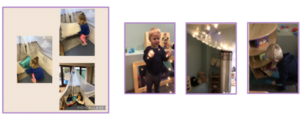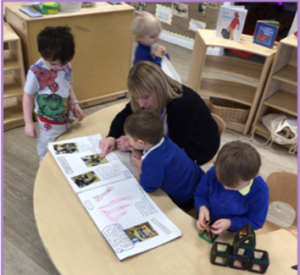Hello! I am Elaine Haughton and this session I have been supporting Victoria ELC with their improvement journey. Priorities for my improvement work link to the school and ELC improvement plan. This year for the ELC there is a focus on children’s emotional well-being and how this is supported by the environment, improving children’s progress in literacy, and ensuring children’s learning is visible and their voice is heard.
During session 20-21 ELC children were supported to manage their emotions by building on and expanding emotion word vocabulary. This session, practitioners continue to support children to explore and manage their emotions. Children are encouraged to resolve conflict through restorative approaches, and the team are working together to develop cosy and nurturing spaces. It is essential that practitioners provide an environment for children that supports their emotional wellbeing. Children need positive and nurturing relationships. They engage in learning experiences best when they are feeling calm and alert and should be encouraged to self-regulate with the support of an adult. The environment plays a fundamental part in supporting children’s emotional wellbeing, as sometimes very small changes can have a huge impact on children’s experiences.
Children should be at the centre of how we practice. It is important that we follow their lead in planning for their development and learning, focusing on what matters to them. Through participation, children acquire skills, build competence, extend aspirations, and gain confidence.
The ELC are on a journey to make children’s learning visible through documentation. Practitioners need to be able to truly listen to children through their observations, involvement, and interactions. The team are also recognising the UNCRC articles when planning for experiences and spaces. There is a focus on the importance of listening to children’s voice and documenting what matters to them during interactions, the experiences offered, and spaces provided both indoors and out. By making learning more visible, families can play a greater part in the everyday life of the ELC setting and their child’s learning.
I’m sure by now that most of you are aware of how highly I value the importance of repeated reading with young children. To help to improve literacy outcomes for children the ELC have significantly reduced the number of books on offer at story area, offering eight core books over the year. Through this, practitioners will support children to further extend their vocabulary and ability to recall and retell a story. Along with EYO literacy champion we have engaged in collaborative working with link Speech and language therapist Iona Smith to develop a user-friendly vocabulary toolkit. I look forward to sharing this more widely once data has been gathered, analysed, and evaluated. The concept of repeated reading is shared through home links with families and a SWAY was created to highlight to parents the importance of reading with their child. Home links help to ensure there are increased opportunities for children to engage with the same story, across both the ELC and home setting, with an adult.
Working with families is such an important part of the work that we all do in early years. Over the past couple of months, I have been in contact with the Hospitality Business Development Manager for Forth Valley College. We have been exploring the possibility of eventually being able to utilise one of the rooms within the college to work with a small group of children and their families. I am delighted to say that this partnership journey with Forth Valley College has commenced. Watch this space!
By Elaine Haughton





